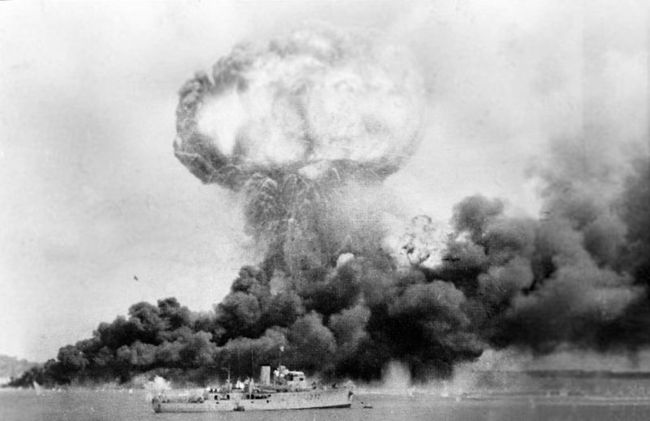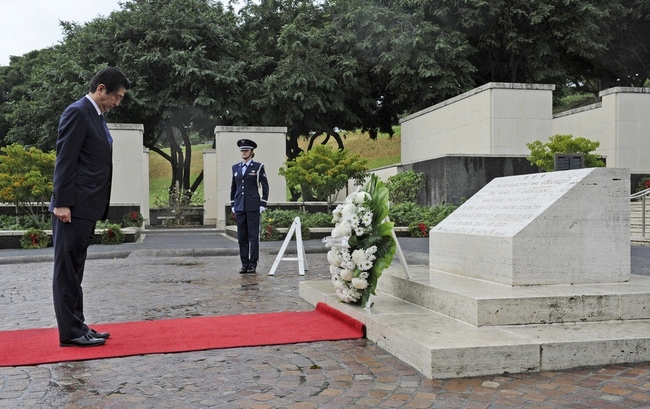Posted on : Nov.14,2018 16:13 KST
 |
|
An image of the Japanese blitz on the Australian city of Darwin that occurred on Feb. 19, 1942
|
Duplicitous Japanese prime minister expresses remorse to the West while snubbing Asia
On the morning of Feb. 19, 1942, Japanese bombers appeared in the sky above Darwin, a port city in northern Australia. In the blitz by 188 planes based on four aircraft carriers, more than 250 soldiers from Australia and other Allied countries lost their lives. The attack is known as Australia’s Pearl Harbor, having taken place about two months after the bombing of the American naval base. By destroying the Allies’ logistics base at Darwin, the Japanese hoped to eliminate an obstacle to their invasion of Southeast Asia.
During a trip to Australia from Nov. 16 to 17, Japanese Prime Minister Shinzo Abe will be visiting Darwin. This is the first visit to the city by a Japanese prime minister since Japan’s defeat in World War II. The Japanese press reported that Abe will be visiting a memorial to the fallen with Australian Prime Minister Scott Morrison. An analyst with Kyodo News said that Abe hopes to use his visit to emphasize the two countries’ reconciliation and their “strategic partnership.”
As Japan seeks to contain China with its strategy of a “free and open” Indo-Pacific, its key partners are India and Australia. Next year, Japan’s Air Self-Defense Force and the Royal Australian Air Force will be holding their first ever joint exercises in Japanese territory.
 |
|
Japanese Prime Minister Shinzo Abe pays his respects to the victims of the attack on Pearl Harbor at the National Memorial Cemetery of the Pacific in Honolulu, Hawaii, during his US visit in 2016. (AP)
|
Abe is a historical revisionist who told the Japanese Diet in 2013 that “aggression has not been defined either academically or internationally.” In a statement released in 2015, he said that “we must not continue to impose upon our children and grandchildren the fate of apologizing.”
But when it comes to the major allied countries, Abe has expressed regret as appropriate. During a visit to Pearl Harbor in Hawaii in 2016, Abe offered an “eternal memorial to the souls of the many innocents who lost their lives in the war.” A repeat performance is likely to be seen during Abe’s visit to Darwin. In an address to the US Congress in 2015, Abe said that “Postwar Japan has continued the course of history while feeling keen regret for the last war.”
Abe has adopted a different attitude to the Asian countries that were trampled under Japan’s imperialism. He may visit Pearl Harbor or Darwin, but he has never expressed remorse or condolences during visits to the sites that Asians recall with grief. When Abe visited Pearl Harbor in 2016, the Chinese government said, “If Abe intends to show deep remorse and apologize sincerely, there are many places in China, including the Nanjing Massacre Memorial Hall, that would provide an opportunity for Japan to express its condolences.”
The duplicitous attitude of the Abe administration is also linked to the issue of forced laborers, which has become a source of friction between South Korea and Japan. The Japanese government and Japanese companies have adopted the position that the issue of compensation for Korean workers should be treated differently because Korea was a Japanese colony during the War in the Pacific. This conflicts with the approach that Japan has taken with China, which was partly colonized by Japan and was one of the victors in the war.
In 2016, Mitsubishi Materials (formerly Mitsubishi Mining) agreed to apologize and pay a settlement to some Chinese labor conscripts. This step reflected the Japanese government’s desire to mend ties with China. But Mitsubishi Heavy Industries, despite being part of the same group, has refused to pay damages to Korean victims. After the South Korean Supreme Court ordered Nippon Steel and Sumitomo Metal to pay damages on Oct. 30, the Japanese government has been briefing Japanese companies not to obey that ruling.
In related news, Japan has been using the word “plan” instead of “strategy” in regard to its Indo-Pacific strategy, out of consideration for Southeast Asian countries that are worried about provoking China. Japan continues to use the word “strategy” with the US, however.
By Cho Ki-weon, Tokyo correspondent
Please direct comments or questions to [english@hani.co.kr]










